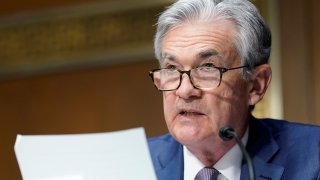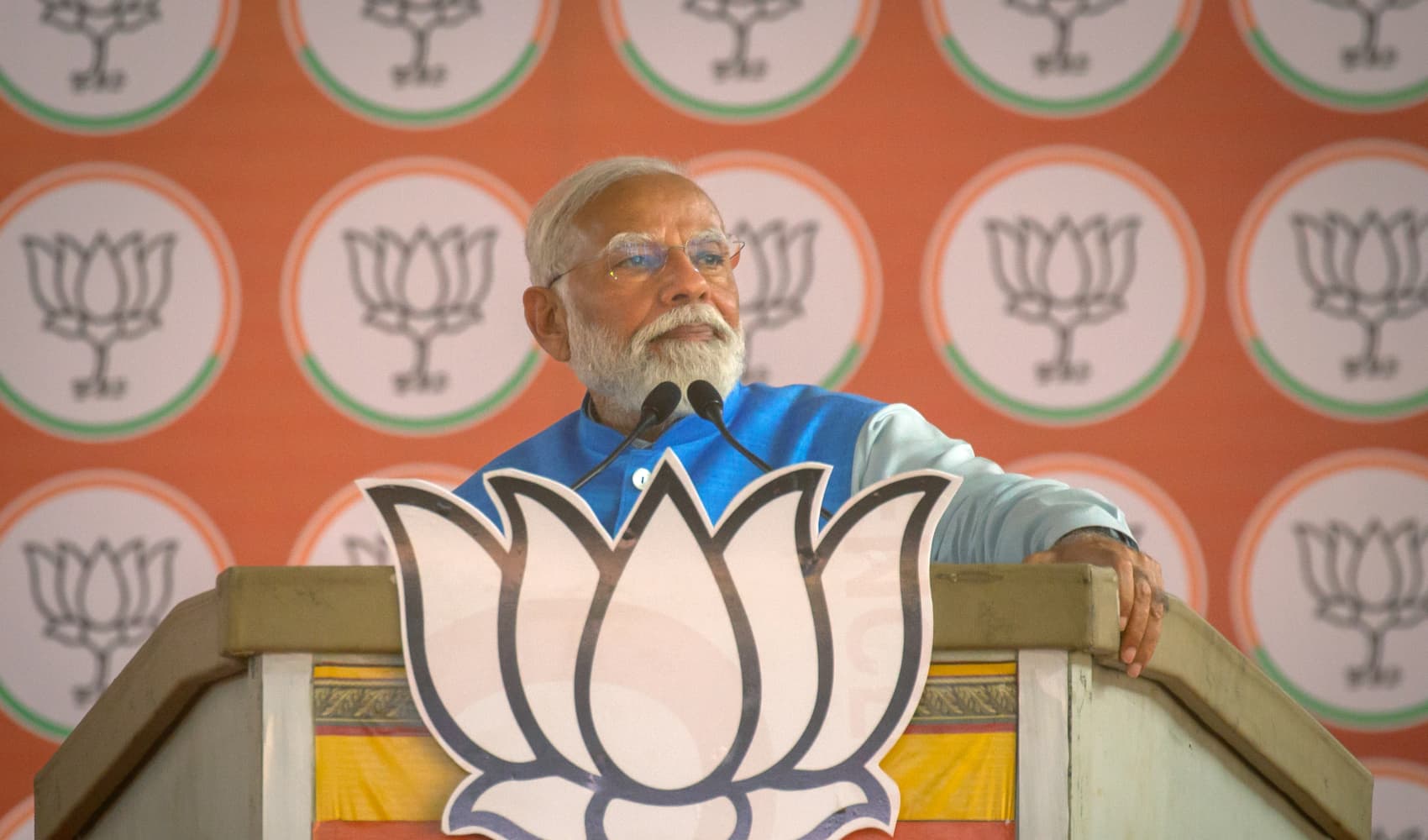
Federal Reserve Chairman Jerome Powell delivers his semiannual monetary policy report to Congress this week starting on Tuesday in the Senate.
Federal Reserve Chairman Jerome Powell spoke Tuesday before the Senate Banking Committee. His Capitol Hill tour continues Wednesday before the House Financial Services Committee.
Powell's Senate testimony concludes
We're making it easier for you to find stories that matter with our new newsletter — The 4Front. Sign up here and get news that is important for you to your inbox.
The Senate Banking Committee wrapped its hearing with Powell around 12:25 p.m. ET.
Powell says Treasury bill rates heading lower due to strong demand
Fed Chairman Jerome Powell said strong demand is driving Treasury bill yields close to zero.
Money Report
"It's a lot of demand for short-term," said Powell. "There's a lot of liquidity, and people want to store it" in Treasury bills.
Powell said Treasury instruments are the concern of the Treasury Department, and the Fed is more concerned about keeping its target fed funds rate in its targeted range of zero to 0.25%.
"To the extent there is downward pressure on that because of, for example, the Treasury General Account shrinking in size, we have tools we can use to keep that rate in our intended policy range, and we will do that," he said. "That should also limit the extent to which other money market instruments go even lower or perhaps negative."
— Patti Domm
ING economists see increasing chance that Fed will have to pare bond buying before year end
ING economists said they see increased chances the Fed will pare back its bond buying program before year end.
In a note released during Fed Chairman Jerome Powell's testimony, they said the Fed chairman acknowledged better economic news at the Senate Banking Committee hearing, but still saw the recovery as uneven and "far from complete."
"Given this situation and the revised monetary policy goals the Fed remains committed to supporting the economy with QE continuing apace. We suspect that the pressure for change will build through the second quarter with a tapering of QE looking increasingly before year-end," the economists wrote.
The Fed is buying $80 billion in Treasurys each month, and $40 billion in mortgages. Powell said he expects the buying to continue until the Fed makes progress on its goals.
Some economists expect the Fed will begin to discuss tapering later this year, but not actually slow purchases until 2022.
— Patti Domm
Powell declines to say if he's 'cool' with Biden stimulus plan
President Joe Biden's big spending plan making its way through Congress is neither cool nor uncool, according to Fed Chairman Jerome Powell.
Asked by Sen. John Kennedy, R-La., whether he, in fact, is a fan of the $1.9 trillion spending plan, the central bank chair demurred.
"I think by being either cool or uncool, I would have to be expressing an opinion," Powell said.
Amid the "cool" or "uncool" grilling, Kennedy also asked Powell if he would "go Catwoman" and try to find things to cut. Powell said he was unaware of the cultural reference.
The stimulus program is expected to get through Congress largely intact but with little or no Republican support. A key objection to the plan is the impact it would have on a federal budget deficit, which is already projected to be $2.3 trillion this year not counting the administration's proposal.
Kennedy asked Powell if he thought deficits matter.
"I think that we will need to get back on a sustainable fiscal path. The way that has worked when it is successful is you just get the economy growing faster than the debt," Powell said. "That's going to need to happen, but it doesn't have to happen now."
— Jeff Cox
Sen. Warren pushes Powell to combat wealth inequality
Sen. Elizabeth Warren, D-Mass., pushed Powell to do more to reduce income and wealth inequality in the United States. Warren, a longtime and vocal skeptic of Wall Street, argued for a wealth tax to "level the playing field."
"Inequality also shows up in wealth, which is what families build over time: Money in the bank, home, stock. Wealth inequality is even more extreme in our nation than income inequality," Warren said. "While the top 1% of families ... got 20% of all of the income earned in the U.S. last year, the top 1% held 33% of the total wealth in this nation."
Warren asked Powell if he would support tax reforms that work to reduce wealth inequality.
"We can't affect wealth inequality, certainly in the short term. We can affect, indirectly, income inequality by doing what we can to support job creation at the lower end of the market," Powell said.
"Those are really fiscal policy issues," he added.
— Thomas Franck
Powell says Treasury yield rise reflects market's confidence in recovery
Fed Chairman Jerome Powell said rising Treasury yields are one of many financial conditions the Fed watches, and yields are rising on expectations of an improving economy.
"In a way, it's a statement of confidence on the part of the market that we will have a robust and ultimately complete recovery," he said.
The 10-year Treasury yield was at 1.35% Tuesday, after hitting a high this week of 1.39% Monday. The 10-year yield, which moves opposite price, ended 2020 at 0.91%. Its rapid run higher this month has begun to pressure stocks.
Bond market pros had been waiting for Powell's view on why rates were rising and whether he was concerned by it. The 10-year yield has barely changed during his comments.
— Patti Domm
Powell doesn't see inflation threat, says dynamics don't 'turn on a dime'
Powell said he doesn't see inflation as a threat, but the Fed has the tools to deal with it if it becomes one.
He told the Senate Banking Committee that there will be temporary base effects in spring inflation data this year, after the very low readings of last March and April.
"We've been living in a world for a quarter of a century where the pressures were disinflationary," he said. "Inflation dynamics do change over time, but they don't turn on a dime."
Powell said fiscal stimulus is not likely to create persistent or large increases in prices.
"If it turns out unwanted inflation pressures arise, and they're persistent, we have the tools to deal with that," he said.
— Patti Domm
Fed policy playing a role in asset price jumps, Powell says
Monetary policy is playing a role in the rise of some asset prices, Fed Chairman Jerome Powell acknowledged.
Sen. Pat Toomey, R-Pa., suggested that the Fed's easy monetary policy is contributing to "bubbles," citing the recent GameStop trading frenzy and rises in inflation-linked bonds, real estate prices, some commodities and other assets.
"There's certainly a link," Powell said, a position he has resisted taking in the past. "There are many factors contributing to what's happening in markets right now, and monetary policy I certainly would agree is one of them."
Toomey countered that "there are a lot of warning signs that have not been worrisome in the past but now are certainly blinking yellow." The senator added that he hopes that the current position of monetary policy, including at least $120 billion of bond purchases a month, is not permanent.
— Jeff Cox
Powell comments are 'very dovish,' says Boockvar
Peter Boockvar, strategist of Bleakley Advisory Group, called Powell's comments "very dovish."
"Bottom line, the Fed is focused on employment and seems very willing to absorb higher inflation and excesses in financial market that brings financial instability in hopes of getting there," Boockvar wrote. "But, as seen in the long end of the yield curve, the markets have a say here too and they are speaking loudly. Hopefully at some point Fed officials will listen."
— John Melloy
Fed Chair's testimony fails to mention rise in interest rates
Though Fed Chairman Jerome Powell's testimony acknowledged the central bank's goals of maximum employment and tame inflation, it left out a key market development: the steady rise in interest rates this year.
The uptick in long-dated Treasury yields has kept investors on edge in recent weeks as higher borrowing costs weigh on high-growth tech stocks. Higher bond yields can also start to attract investors, who may find bonds' relative safety attractive if debt can offer a somewhat reasonable rate of return.
The 30-year bond, for instance, is up more than half a percentage point and the benchmark 10-year yield has risen 44 basis points.
— Thomas Franck
Powell tells Senate committee that inflation is 'soft'
Powell testified on Tuesday that inflation and employment remain well below the Fed's targets, meaning easy monetary policy is likely to stay in place.
"The economy is a long way from our employment and inflation goals, and it is likely to take some time for substantial further progress to be achieved," the Fed chief said in prepared remarks to the Senate Banking Committee.
He added that the Fed is "committed to using our full range of tools to support the economy and to help ensure that the recovery from this difficult period will be as robust as possible."
— Thomas Franck, Jeff Cox
Markets watching Powell speech for clues about policy
Investors were watching closely Tuesday as Federal Reserve Chairman Jerome Powell spoke to the Senate Banking Committee.
Markets are looking for observations on the future path of interest rates and the central bank leader's views on the recent rise in bond yields. Powell's presentation will start with prepared remarks, followed by a Q&A session with committee members.
The appearance is part of the congressionally mandated semiannual report on monetary policy.
— Jeff Cox






